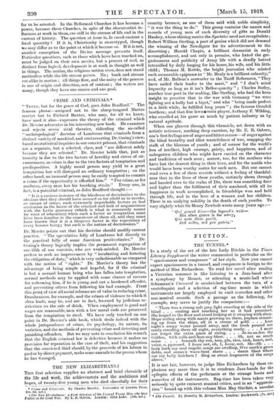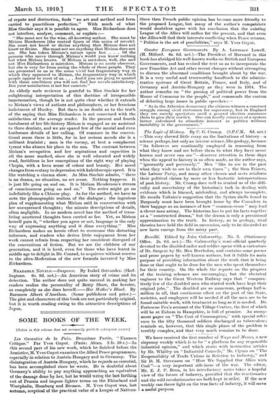FICTION.
THE TUNNEL.•
IN a study of the art of the late Lady Ritchie in the Times Literary Supplement the writer commented in particular on the "spaciousness and composure" of her style. Now you cannot expect spaciousness in a tunnel, and composure is foreign to the method of Miss Richardson. To read her novel after reading a Victorian romance is like listening to a Jazz-band after a symphony by Mozart, or attending a music-hall where Schumann'a Carnal:al is sandwiched between the turn of a ventriloquist and a selection of rag-time mud() in which instruments are largely employed to emit screeches and other non-musical sounds. Such a passage as the following, for example, may serve to justify the comparison :— " There was a strong soft grey light standing at else side of the blind . . . smiling and touching her as it had promised. She leaped to the floor and stood looking at it swaying with sleep. Ships sailing along with masts growing on them, poplars stream- ing up from the ships, all in a steam of gold. . . Last night's soapy water poured away, and the fresh poured out ready standing there all night, everything ready. . . I must not forget the extra piece of string. . . . Je-ru-sa-test the Golden, with•milk-and-hun.ney-blest. . . . Sh, not so much noise . . . beneath thy con, tern, plc, tion, sink, heart, and, voice, o, ppressed- I know not, oh, I, know, not. Sh—Sh . - • hark hark my soul angelic songs are swelling, O'er earth's green fields, and ocean's wave-beat shore . . . damn blast where are my belly knickers ? Sing us sweet fragments of the songs above."
It is not fair, however, to judge Miss Richardson by these ex- plosions any more than it is to condemn Jazz-bands for the epileptic efforts of the performers or the strange hoots and screeches of the instruments. Rag-time has been taken very seriously by quite eminent musical critics, and in an " apprecia- tion" bound up with this volume Miss May Sinclair, a novelist • I'M Tassel. By Dostally M. Richardson, London: Duckworth. 17s, net.)
of repute and distinction, finds " an art and method and form carried to punctilious perfection." With much of what Mies Sinclair says it is possible to agree. Miss Richardson does not interfere, analyse, comment, or explain :—
" She must not be the wise, all-knowing author. She must be Miriam Henderson [the central figure of this series of novels]. She must not know or divine anything that Miriam does not know or divine. She must not see anything that Miriam does not see. She has taken Miriam'e nature upon her. . . . Of the persons who move through Miriam's world you know nothing but what Miriam knows. If Miriam is mistaken, well, she and not Miss Richardson is mistaken. Miriam is an acute observer, but she is very far from seeing the whole of these people. They are presented to us in the some vivid but fragmentary way in which they appeared to Miriam, the fragmentary way in which people appear to most of us. ... And if you aro going to quarrel with those conditions you will not find her novels satisfactory. But your satisfaction is not her concern."
An elderly male reviewer is grateful to Miss Sinclair for her enlightening interpretation of this doctrine of irresponsible impersonation, though ho is not quite clear whether it extends to Miriam's views of authors and philosophers, or her ferocious indictment of Huxley. But there is no doubt as to the truth of the saying that Miss Richardson is not concerned with the satisfaction of the average reader. In the present and fourth instalment of her life-history Miriam is engaged as an assistant to three dentists, and we are spared few of the menial and even loathsome details of her calling. Of romance in the convrn. tional sense there is little, for in her serious moods she is a militant feminist ; man is the enemy, at best a complacent tyrant who abuses his place in the sun. The contrast between Miriam's occupation and her aspirations and capacities is all the more marked, since she is well educated and widely read, fastidious in her conceptions of the right way of playing Chopin, with a keen sense of colour and beauty. Her mood changes from ecstasy to depression with kaleidoscopic speed. It is like watching a cinema show. As Miss Sinclair admits, " there is no drama, no situation, no set scene. Nothing happens. It is just life going on and on. It is Miriam Henderson's stream of consciousness going on and on." The series might go on indefinitely like a Chinese play. As for the method, we have to note the phonographic realism of the dialogue ; the ingenious plan of supplementing what Miriam said in conversation with her unexpressed thoughts ; the minute descriptions of details, often negligible. In no modern novel has the method of trans- lating unuttered thoughts been carried so far. Yet, as Miriam herself puts it, " whether you agree or not, language is the only way of expressing anything and it dims everything." Miss Richardson makes an heroic effort to overcome this distorting influence, and readers who derive little enjoyment from her work cannot refrain from respecting her consistent disregard of the conventions of fiction. But we are the children of our generation, and it is hard, even for those who have learnt in middle age to delight in Mr. Conrad, to acquiesce without reserve in the ultra-Modernism of the new formula invented by flies Richardson.







































 Previous page
Previous page